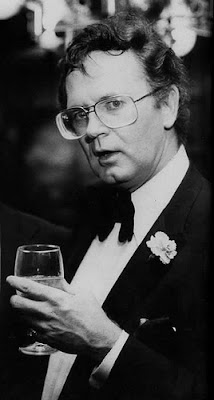That's right, the feature film version of "Broadway" Joe Namath's life will be coming soonish to a theater near you starring Jake Gyllenhaal. As I read the news today on ESPN.com, I started thinking about the two Joe Namath scripts I read for work a few years back, both titled "Broadway Joe." Neither one really made a convincing case that Joe's life was worthy of a made-for-cable movie then, and I'm even less convinced that his story is compelling enough for the big screen today.
Let's look at the numbers:
On the plus side, he was QB for Alabama's 1964 National Championship team, as well as the only QB ever to lead the New York Jets to a title, winning Super Bowl III in 1968. He was very, very famous sex symbol and sports hero then, and is still a household name today.
On the minus side, his career numbers fall between ordinary and below average. His career Quarterback Rating is an eye-poppingly bad 65.5 (good for #131 on the list of the 148 QBs with at least 1500 Pass Attempts). His touchdown to interception ratio is 173-220. Although he is in the Hall of Fame, his career passing yardage of 27,663 ranks 43rd all time, just 61 yards ahead of Jeff George.
I guess you can throw those numbers out for two reasons:
1. He played in NYC
2. He had star power.
But is that enough to get moviegoers under 40, who weren't even born when his star burned the brightest, to pay $11 to see his story? If the movie takes the clichéd "celebrity is bad for your health" tack, my prediction is no.
I dug in my archives to see what I'd thought of the two other Namath scripts (I would instantly forget what I wrote when I was writing coverage for a living). I'll spare you the plot summaries and redact the names of the guilty (though I can tell you that neither were hired to write the Gyllenhaal film) while pasting in the coverage sections of both.
"Broadway Joe" by XXXX, written 2005
Joe Namath is indeed still famous, but XXXX’s BROADWAY JOE is unable to convincingly justify the biopic treatment for a man best known for backing up his guarantee that the New York Jets would win the Super Bowl 36 years ago. XXXX gives the material a slick, glossy feel but the resulting narrative is a fast-fading illusion of drama, not the real thing. Framing device of a look at the Namath of today backfires. If we open on the drunken mess of a man who embarrassed himself on ESPN and flashback to the past only to find that Namath was a drunken mess of a man then too (but happened to get his act together long enough one season to win a Super Bowl), what have we learned? Script stirs together a father complex, bad knees, the mafia, celebrity pop-ins by Warhol and Elizabeth Taylor, the friction between Pete Rozelle and Sonny Werblin (!!!) and plenty of sex and profanity, but cannot cobble together a central character strong enough to transcend. The description of the on-the-field action is gritty, but Namath’s sudden ability to diagram superior plays during the Super Bowl run comes from nowhere. XXXX loses more credibility when Namath, fresh off a second knee surgery and barely able to walk, dunks a basketball to impress an African-American teammate that he’s no fancy rich boy (p84). BROADWAY JOE tries strenuously, but is ultimately unable to convey that “the Joe Namath story” is somehow meaningful beyond his ability years ago to pass the football.
and
"Broadway Joe" by YYYY, written 2004
YYYY has undeniable skill in the craft of screenwriting, but shows little grasp of the art of it with BROADWAY JOE. Title is a bit of a misnomer, as the story is far more focused on Jets founder Sonny Werblin. When the titular character of a biopic comes off as a wooden prop, a certain degree of failure is inevitable. Sonny talks a big game about how he’s got Joe’s best interest at heart, thinks of him as a son, etc. but we never get a sense of why he does- Joe isn’t particularly infatuated with Sonny and he’s terrible in the field the first few years, too busy chasing skirt and getting loaded. Joe the character comes off as a bit of a dim bulb, except when convenient for the plot. The season they win the Super Bowl Joe is referred to as “the professor” on p70, yet when Sonny gives him a thematically-relevant book Joe looks through it and complains “No pictures?” (p85). Dialogue is very linear and uses heavy profanity as a spice to flavor otherwise bland interchanges. Very little football action. Script doesn’t cater to existing fans (his infamous guarantee that the Jets would beat the heavily favored Colts in the Super Bowl is only mentioned in passing after the fact), nor is it likely to convert any new ones with dull subplots centered on Joe’s gambler friends and Sonny’s rivalry with Pete Rozelle. BROADWAY JOE reads briskly but the journey is meandering and, at the end of the day, the character work is just not that compelling.
I guess time will tell whether or not my warnings not to walk down "Joe Willie's" cinematic path are borne out. I have a feeling that the deeper into the Deep Fried Media Age a subject lived in/found stardom in, the less likely people are going to be to plunk down money to see a dramatization of things they've already seen unfold in real time. No one can deny that the O.J. Simpson murders and trial were dramatic, but can you imagine anyone who lived through it wanting to see a two hour version of the story on the big screen?
A final note- biopics as a genre are fast becoming as tedious and uninspired as the remake. There will always be a place for the Illumination (an obscure-but-compelling life is brought to the forefront, à la John Nash in A BEAUTIFUL MIND) and the Revelation (what really made a mysterious figure tick, à la Ian Curtis in CONTROL), but the Demythologization approach (see ALI or THE LIFE AND DEATH OF PETER SELLERS) is a dicey gamble.
Who wants to see their heroes taken down a peg? Aren't there too few as it is?
You know that a genre is reaching the tipping point when it's getting directly satirized (the 12/21 release WALK HARD: THE DEWEY COX STORY), but that doesn't mean there still aren't worthy subjects and films to come. Out of the following list of upcoming/planned musical biopics (taken from the pages of Vogue's Fall 2007 Supplement "Movies Rock"), I wonder which subject seems the most promising to you? (Actors listed are rumored or attached)
Miles Davis (Don Cheadle)
Joan Jett (TBD)
Otis Redding (TBD)
Rick James (Terrence Howard)
Muddy Waters (Terrence Howard)
Janis Joplin (Zooey Deschanel)
Iggy Pop (Elijah Wood)
Mötley Crüe (TBD)
Debbie Harry/Blondie (Kirsten Dunst)
In closing, a spot-on quote from Roger Ebert (discussing the Rubin Carter biopic THE HURRICANE):
Those who seek the truth about a man from the film of his life might as well seek it from his loving grandmother.
























